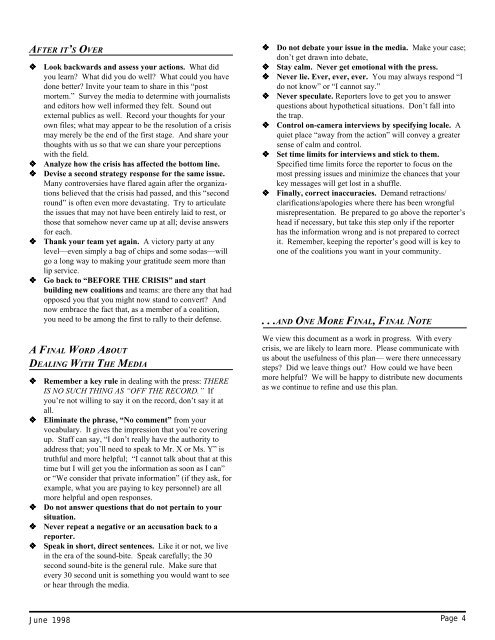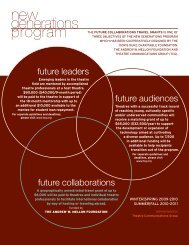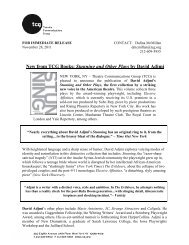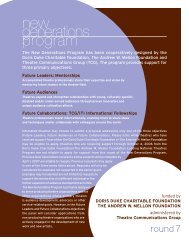Action Plan for Crisis (PDF) - Theatre Communications Group
Action Plan for Crisis (PDF) - Theatre Communications Group
Action Plan for Crisis (PDF) - Theatre Communications Group
- No tags were found...
You also want an ePaper? Increase the reach of your titles
YUMPU automatically turns print PDFs into web optimized ePapers that Google loves.
AFTER IT’S OVER! Look backwards and assess your actions. What didyou learn? What did you do well? What could you havedone better? Invite your team to share in this “postmortem.” Survey the media to determine with journalistsand editors how well in<strong>for</strong>med they felt. Sound outexternal publics as well. Record your thoughts <strong>for</strong> yourown files; what may appear to be the resolution of a crisismay merely be the end of the first stage. And share yourthoughts with us so that we can share your perceptionswith the field.! Analyze how the crisis has affected the bottom line.! Devise a second strategy response <strong>for</strong> the same issue.Many controversies have flared again after the organizationsbelieved that the crisis had passed, and this “secondround” is often even more devastating. Try to articulatethe issues that may not have been entirely laid to rest, orthose that somehow never came up at all; devise answers<strong>for</strong> each.! Thank your team yet again. A victory party at anylevel—even simply a bag of chips and some sodas—willgo a long way to making your gratitude seem more thanlip service.! Go back to “BEFORE THE CRISIS” and startbuilding new coalitions and teams: are there any that hadopposed you that you might now stand to convert? Andnow embrace the fact that, as a member of a coalition,you need to be among the first to rally to their defense.A FINAL WORD ABOUTDEALING WITH THE MEDIA! Remember a key rule in dealing with the press: THEREIS NO SUCH THING AS “OFF THE RECORD.” Ifyou’re not willing to say it on the record, don’t say it atall.! Eliminate the phrase, “No comment” from yourvocabulary. It gives the impression that you’re coveringup. Staff can say, “I don’t really have the authority toaddress that; you’ll need to speak to Mr. X or Ms. Y” istruthful and more helpful; “I cannot talk about that at thistime but I will get you the in<strong>for</strong>mation as soon as I can”or “We consider that private in<strong>for</strong>mation” (if they ask, <strong>for</strong>example, what you are paying to key personnel) are allmore helpful and open responses.! Do not answer questions that do not pertain to yoursituation.! Never repeat a negative or an accusation back to areporter.! Speak in short, direct sentences. Like it or not, we livein the era of the sound-bite. Speak carefully; the 30second sound-bite is the general rule. Make sure thatevery 30 second unit is something you would want to seeor hear through the media.! Do not debate your issue in the media. Make your case;don’t get drawn into debate,! Stay calm. Never get emotional with the press.! Never lie. Ever, ever, ever. You may always respond “Ido not know” or “I cannot say.”! Never speculate. Reporters love to get you to answerquestions about hypothetical situations. Don’t fall intothe trap.! Control on-camera interviews by specifying locale. Aquiet place “away from the action” will convey a greatersense of calm and control.! Set time limits <strong>for</strong> interviews and stick to them.Specified time limits <strong>for</strong>ce the reporter to focus on themost pressing issues and minimize the chances that yourkey messages will get lost in a shuffle.! Finally, correct inaccuracies. Demand retractions/clarifications/apologies where there has been wrongfulmisrepresentation. Be prepared to go above the reporter’shead if necessary, but take this step only if the reporterhas the in<strong>for</strong>mation wrong and is not prepared to correctit. Remember, keeping the reporter’s good will is key toone of the coalitions you want in your community.. . .AND ONE MORE FINAL, FINAL NOTEWe view this document as a work in progress. With everycrisis, we are likely to learn more. Please communicate withus about the usefulness of this plan— were there unnecessarysteps? Did we leave things out? How could we have beenmore helpful? We will be happy to distribute new documentsas we continue to refine and use this plan.June 1998 Page 4










